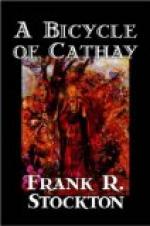“You’re stoppin’ here for the night?” he asked. I presumed from his voice and appearance that he was a stable-man, and from his tone that he was disappointed that I had not brought a horse with me.
I assented to his question, and he said:
“I never heard of no fishin’. When people want to fish, they go to a lake about ten miles furder on.”
“Oh, I do not care particularly about fishing,” I said, “but there must be a good many pleasant roads about here.”
“There’s this one,” said he. “The people on wheels keep to it.” With this he turned and walked slowly towards the back of the house.
“A lemon-loving lot!” thought I, and as I approached the porch I saw that the lady who had gone to school at Walford was standing there. I did not believe she had been eating lemons, and I stepped forward quickly for fear that she should depart before I reached her.
“Been taking a walk?” she said, pleasantly. There was something in the general air of this young woman which indicated that she should have worn a little apron with pockets, and that her hands should have been jauntily thrust into those pockets; but her dress included nothing of the sort.
The hall lamp was now lighted, and I could see that her attire was extremely neat and becoming. Her face was in shadow, but she had beautiful hair of a ruddy brown. I asked myself if she were the “lady clerk” of the establishment, or the daughter of the keeper of the inn. She was evidently a person in some authority, and one with whom it would be proper for me to converse, and as she had given me a very good opportunity to open conversation, I lost no time in doing so.
“And so you used to live in Walford?” I said.
“Oh yes,” she replied, and then she began to speak of the pleasant days she had spent in that village. As she talked I endeavored to discover from her words who she was and what was her position. I did not care to discuss Walford. I wanted to talk about the Holly Sprig Inn, but I could not devise a courteous question which would serve my purpose.
Presently our attention was attracted by the sound of singing at the corner of the little lawn most distant from the house. It was growing dark, and the form of the singer could barely be discerned upon a bench under a great oak. The voice was that of a man, and his song was an Italian air from one of Verdi’s operas. He sang in a low tone, as if he were simply amusing himself and did not wish to disturb the rest of the world.
[Illustration: Mrs. Chester]
“That must be the Italian who is stopping here for the night,” she said. “We do not generally take such people; but he spoke so civilly, and said it was so hard to get lodging for his bear—”
“His bear!” I exclaimed.
“Oh yes,” she answered, with a little laugh, “he has a bear with him. I suppose it dances, and so makes a living for its master. Anyway, I said he might stay and lodge with our stable-man. He would sing very well if he had a better voice—don’t you think so?”




